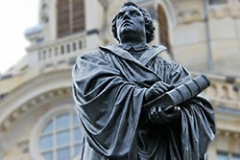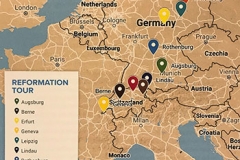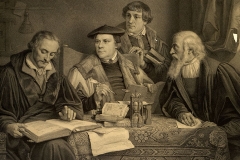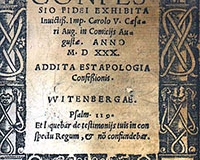Historical Society, Foundation lead 500th anniversary tour
November 16, 2017
Throughout 2017, the Presbyterian Church (U.S.A.) and Reformed churches worldwide have been commemorating the 500th anniversary of the Protestant Reformation, celebrating the day in late October 1517 when Martin Luther unknowingly spurred a radical movement by posting his 95 theses at the Castle Church in Wittenberg, Germany.
A small group of Presbyterians recently traveled to Leipzig, Germany, to begin a Reformation study tour, developed by the Presbyterian Foundation and the Presbyterian Historical Society (PHS).
The tour was designed to guide participants along the footsteps of the leaders who sparked the Protestant Reformation and to explore the circumstances that led Martin Luther, Ulrich Zwingli, John Calvin and other reformers to call the Roman Catholic Church’s practices into question.
Participants also examined how the consequences of the Reformation movement have led to the state of Reformed churches today and contemplated what it means to be Reformed now and in future generations.
The Rev. Dr. Tom Taylor, president and CEO of the foundation, began planning the Reformation study tour in early 2017 and soon learned that PHS was considering a similar opportunity for PHS friends and members.
The Rev. Dr. Beth Hessel, executive director of PHS, said the partnership with the Presbyterian Fountain was a natural choice. “It was a great opportunity for organizations that are both concerned about faith development, faithful stewardship and connecting people with our history and tradition to go together.”
The tour’s timeliness goes beyond celebrating the 500-year milestone. The Rev. Dr. Joseph Small, theologian and church relations consultant for the foundation, said that the reformers of the 16th century “were all dealing with fundamental issues of faith.”
Small developed the tour’s daily study sessions to challenge participants to address these issues in the context of the 21st- century church. “The church we experience today is a consequence of what happened 500 years ago,” he said. “We can’t understand the shape of our faith today unless we know what they are objecting to and the positive proposals they made.”
Small added that the struggles the reformers faced as they worked together and, at times, against one another are a testament to what it means to be “the church reformed and always to be reformed in accord with the word of God.”
The study sessions also included conversations with the Rev. Odair Pedroso Mateus, director of the Commission on Faith and Order of the World Council of Churches; the Rev. Serge Fornerod, the Federation of Swiss Protestant Churches’ director of external relations; the Rev. Dr. Margit Ernst-Habib, theologian and the World Communion of Reformed Churches General Council’s theological coordinator; and Françoise Demole, honorary president of the International Museum of the Reformation Foundation.
The study tour’s journey traversed the cities and towns across Germany and Switzerland that laid the foundation of the Reformed movement, including Wittenberg, Erfurt and Augsburg in Germany, and Wildhaus, Zűrich and Geneva in Switzerland.
Please view video: https://vimeo.com/204967062
Angie Stevens, Office of the General Assembly Communications
Today’s Focus: 500th anniversary of the Protestant Reformation
Let us join in prayer for:
PC(USA) Agencies’ Staff
Edward Thompson, BOP
Mark Thomson, PMA
Let us pray:
Merciful God, we come to you as beggars, trusting in your grace. Give us faith to seek you and faith to follow, through Jesus Christ our Lord. Amen.
Daily Readings
Morning Psalms 36; 147:12-20
First Reading Nehemiah 6:1-19
Second Reading Revelation 19:1-10
Gospel Reading Matthew 16:1-12
Evening Psalms 80; 27
![]() You may freely reuse and distribute this article in its entirety for non-commercial purposes in any medium. Please include author attribution, photography credits, and a link to the original article. This work is licensed under a Creative Commons Attribution-NonCommercial-NoDeratives 4.0 International License.
You may freely reuse and distribute this article in its entirety for non-commercial purposes in any medium. Please include author attribution, photography credits, and a link to the original article. This work is licensed under a Creative Commons Attribution-NonCommercial-NoDeratives 4.0 International License.



